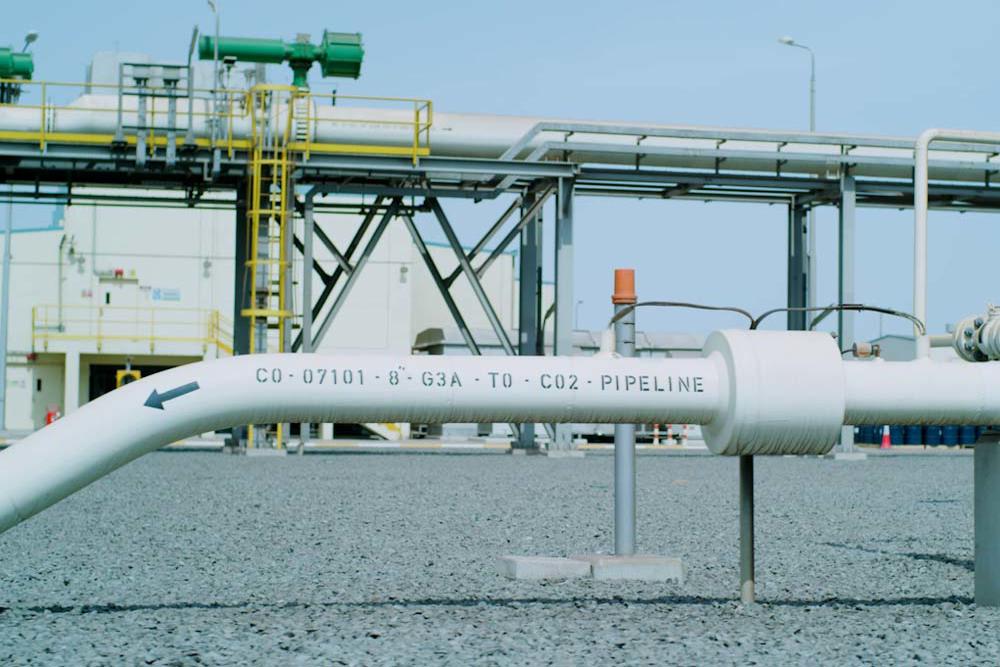
ADNOC has announced a final investment decision (FID) to develop one of the largest carbon capture projects in the Middle East and North Africa (MENA) region.
The Habshan carbon capture, utilisation and storage (CCUS) project will have the capacity to capture and permanently store 1.5 million tonnes per annum (mtpa) of carbon dioxide (CO2) within geological formations deep underground.
The project will triple ADNOC’s carbon capture capacity to 2.3 mtpa, equivalent to removing over 500,000 gasoline-powered cars from the road per year.
The project, to be built, operated and maintained by ADNOC Gas on behalf of ADNOC, will include carbon capture units at the Habshan gas processing plant, pipeline infrastructure, and a network of wells for CO2 injection.
CO2 will be permanently stored in reservoirs deep in the sub-surface through the deployment of closed-loop CO2 capture and reinjection technology at the well site.
The FID forms part of the company’s initial $15 billion decarbonisation investment in low carbon solutions.
Musabbeh Al Kaabi, ADNOC Executive Director of Low Carbon Solutions and International Growth, said: “The Intergovernmental Panel on Climate Change has stated that carbon capture and storage is a critical enabler for the world to achieve net zero by mid-century. This landmark project, is one of many tangible initiatives that ADNOC is delivering as we accelerate our decarbonisation plan to meet our Net Zero by 2045 ambition.
“As ADNOC continues its transformation towards a lower carbon future, it is our intention to make further investments to significantly reduce our emissions, including in carbon capture and storage, and push the boundaries of innovation and technology with our partners, to build on our world-leading legacy and industry leadership in carbon management.”
The announcement is part of ADNOC’s wider carbon management strategy, which aims to create a unique platform that connects all the sources of emissions and sequestration sites to accelerate the delivery of ADNOC and the UAE’s decarbonisation goals.
As part of this strategy, the company is implementing several innovative, technology driven pilot projects, including CO2 mineralisation and full carbon sequestration in saline aquifers.
In 2016, ADNOC opened its first carbon capture, transportation and storage facility at Al Reyadah in Abu Dhabi. The facility has the capacity to process up to 800,000 tonnes of CO2 per year captured at Emirates Steel Arkan. Building on Al Reyadah, the Habshan carbon capture project could provide for enhanced oil recovery of industry leading low carbon-intensity barrels as well as the production of low-carbon feedstocks such as hydrogen, to help customers decarbonise their operations.
The company is decarbonising its operations while also investing in renewables and low carbon fuels, building a global hydrogen value chain, deploying innovative climate technology solutions, and advancing nature-based solutions such as planting mangroves in the UAE.
ADNOC and Occidental are also working to assess potential investment opportunities in the UAE and the United States in both carbon capture and storage and direct air capture.
ADNOC currently acquires all its grid power from the Emirates Water and Electricity Company’s (EWEC) nuclear and solar sources, making the company the first major oil and gas company in the world to decarbonise its power at scale though an agreement of this kind. Furthermore, ADNOC is developing a $3.8 billion project to build a sub-sea transmission network, which upon completion, could reduce ADNOC’s offshore carbon intensity by up to 50 per cent.





